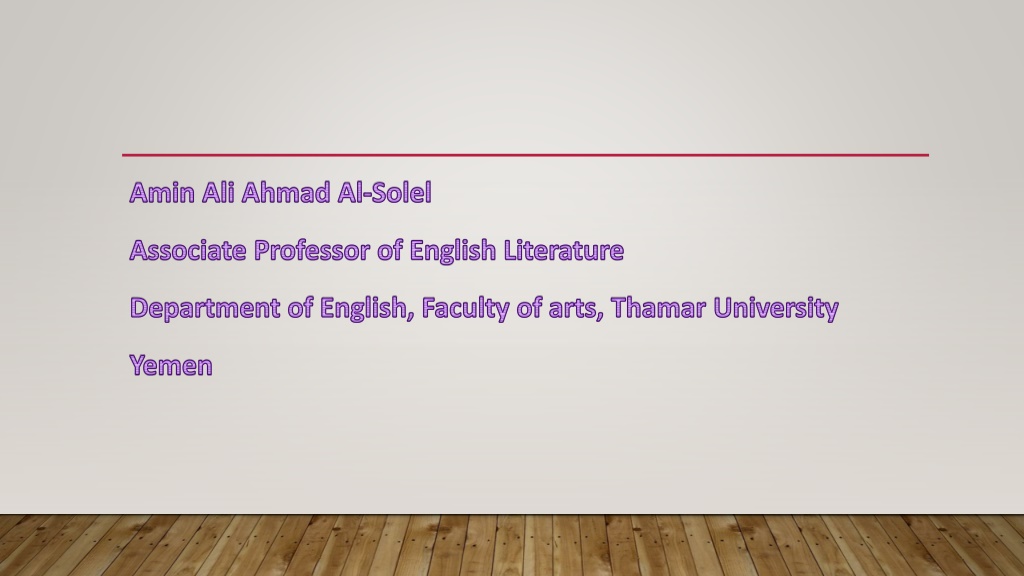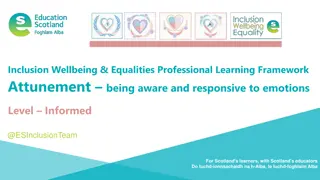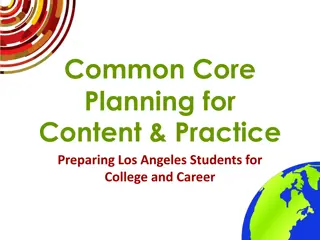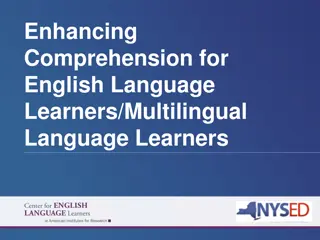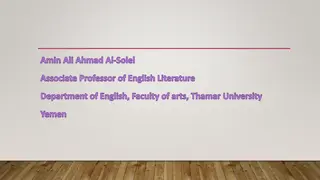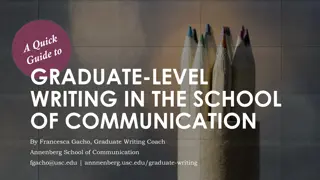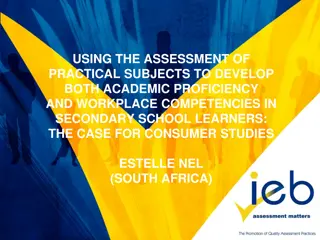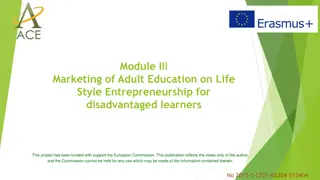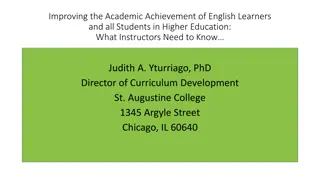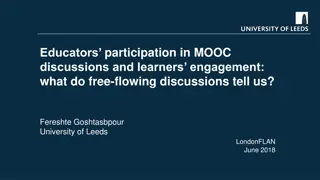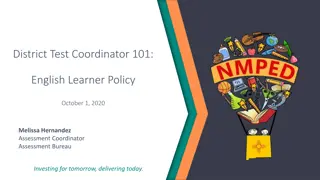Challenges and Perspectives in Academic Writing for English Learners: Insights from Yemeni Students and Educators
Exploring the challenges and experiences of MA English students in academic writing, the narrative reveals issues faced by learners in Yemen such as outdated curricula, lack of teaching aids, and struggles with writing skills. Insights from a teacher highlight improvements in syllabi yet continued challenges in teaching writing effectively, especially for non-native speakers. Results from a questionnaire shed light on students' perspectives and suggestions to enhance academic writing skills. The narrative underscores the need for improved techniques and support for English learners in Yemen to overcome challenges in academic writing.
- Academic writing challenges
- English learners
- Yemeni education system
- Teaching English
- Curriculum improvement
Download Presentation

Please find below an Image/Link to download the presentation.
The content on the website is provided AS IS for your information and personal use only. It may not be sold, licensed, or shared on other websites without obtaining consent from the author. Download presentation by click this link. If you encounter any issues during the download, it is possible that the publisher has removed the file from their server.
E N D
Presentation Transcript
Amin Ali Ahmad Al-Solel Associate Professor of English Literature Department of English, Faculty of arts, Thamar University Yemen
Personal Experience: A Learner English as a school subject: starts in the 7thgrade (six years). - Curriculum: old-fashioned, simple and grammar-focused. - Lack of English professional teachers. - Classical method of teaching (translation using Arabic). - Lack of teaching aids and materials. - Writing and other skills are almost ignored and the focus was on grammar (particularly tenses).
Personal Experience: A Teacher I got my B.Ed. Degree in English in 2000. I started teaching at schools. The syllabus has been improved to be more communicative (the four basic skills in the textbooks are integrated). Writing: the most difficult skill to learn. At the university level: Writing is still challenging for English learners and even teachers (non-native speakers).
The Questionnaire Objective: To explore the M.A. English students perspectives on academic writing challenges and their suggestions to overcome them. Number of participants: 10 (only 6 responded). Questionnaire: Two parts - Part one: 20 close-ended questions. - Part two: 3 open-ended questions.
Rarely: 8 Usually: 36 Often: 46 Always: 36
Chart Title 40 35 30 25 20 15 10 5 0 Category 1 rarely usually often always
RARELY I can logically support my thesis with paraphrases. (1) I can logically support my thesis with summaries. (1) I can logically support my thesis with quotations. (2) I can use a variety of cohesive devices. (1) I can write quickly in English. (1) I can use appropriate strategies to fix problems with my writing. (1) I enjoy writing in English. (1)
Are you satisfied with your academic writing? P 1: Actually, not exactly. I still strive to be a perfect writer. P 2: Yes, I am. P 3: Somewhat, yes. P 4: Not always. I need much to learn and improve.
P 5: No, because we have a little experience in academic writing. Sometimes, I make some mistakes unconsciously as I am not continuously writing. So, the problem is in the developing techniques in writing Arabic texts confuses us with those of English. The problem is not in grammar but ordering clauses or phrases. P 6: No I am not because the more you know about academic writing, the more you find that your writing needs to be improved.
What are the challenges you encounter in academic writing? P 1: 1. As for me, the most notable challenge is that I need much time to make brainstorm or think about the given topic. Therefore, I really don t write perfectly while exams or even through lectures because of the matter of time. 2. I don t have the background or full idea about the topic. 3. The inability of selecting the appropriate words which serve your academic writing. 4. Your circumstances or responsibilities prevent you from practicing continuously.
P 2: The pressure in the exam, and the condition which is related to the time of the exam. P 3: Spelling mistakes. P 4: First, English is a foreign language. Second, absence of practice.
P 5: First of all, cohesion and coherence need to choose the suitable conjunctions, interjections, correcting words, and also the complex sentences always confuse us in our understanding of the English texts. With simple sentences, there is not any challenge. P 6: Some challenges are about cohesion and coherence. Others about the suitable vocabulary as some vocabulary are more academic than others.
What do you suggest to improve the academic writing skills of EFL learners? P 1: The most essential step is to make the subject of academic writing more practical than theoretical and the instructor should give his/her students feedback and evaluation to know their mistakes, their weak points, and try to improve their writing. As much you read, the great writer you will be as well. Of course, practicing as much as you can is the key to being a skillful writer. P 2: To write a lot and we need all the time to correct our essays. P 3: Practice makes perfect. P 4: 1- Practice, 2- Focused and intensive courses.
P 5: Writing more and more is better for the EFL writers and showing and changing the writing texts by teachers, classmates and academic doctors and guides. P 6: I think that practicing is the cornerstone to improving academic writing. Grammar also is very important. I mean that the students should know the ways of sentence structures and they should be able to analyse the parts of the English sentence correctly and then students can go to learn about the strategies of writing complete and attractive paragraphs and essays.
